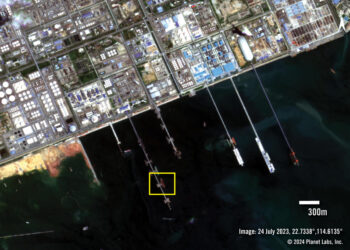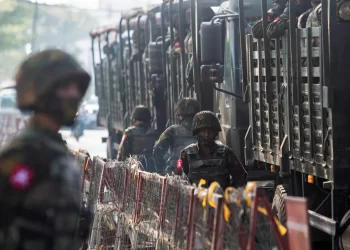Human Lives Human Rights: An investigation found that the military in Myanmar is laying antipersonnel landmines on a massive scale in and around villages in Kayah (Karenni) State, which amounts to war crimes.
Antipersonnel landmines are inherently indiscriminate and their use is internationally banned. The landmines laid by the Myanmar military have killed and seriously injured civilians and will have significant long-term consequences, including on displaced people’s ability to return home and to farm their lands.
The use of landmines by Myanmar military is abhorrent and cruel. At a time when the world has overwhelmingly banned these inherently indiscriminate weapons, the military has placed them in people’s yards, homes, and even stairwells, as well as around a church.
Rights groups call on the international community to urgently respond to the military’s atrocities against civilians across Myanmar. Countries around the world must cut off the flow of weapons to Myanmar and support all efforts to ensure those responsible for war crimes face justice.
The Myanmar military is laying several types of landmines that it manufactures itself. These include the M-14, which typically blows off the victim’s foot at the ankle, and the more powerful MM-2, which often blows off the victim’s leg at the knee and causes injuries to other parts of the person’s body, with severe risk of death due to blood loss.
Antipersonnel landmines, including the M-14 and MM-2, are inherently indiscriminate and their use is banned under customary international humanitarian law, as well as the 1997 Mine Ban Treaty, which 164 states have joined. According to Landmine Monitor, Myanmar’s military is the only state armed forces confirmed to have used antipersonnel landmines in 2020-21.
The Karenni Human Rights Group (KnHRG) has documented at least 20 civilians killed or seriously injured by landmines in Kayah State since June 2021.
According to activists, local aid workers, and people without formal training who have tried to demine villages, the military’s use of landmines there has soared in recent months, especially as they retreat from certain areas.
The military had planted at least eight landmines on the grounds of St Matthew’s church in Daw Ngay Khu village in Hpruso Township in mid-June, when there was fighting in the area. People involved in demining the church believed there were more landmines there that had yet to be discovered.
Researchers saw a discarded uniform of the 66th LID on the church grounds, along with bullet casings and a used round from a 40mm grenade launcher.
In addition to the church, Myanmar soldiers laid landmines in and near homes in Daw Ngay Khu village, according to six people who lived there as well as people who had demined parts of the village. Other areas of Daw Ngay Khu likely remain contaminated.
The Myanmar military has laid landmines in at least 20 villages in Hpruso, Demoso, and Loikaw Townships in recent months. There are likely many more contaminated villages across Kayah and southern Shan States.
The military appears to be systematically laying landmines near where it is based as well as in areas from which it retreats. The region along the main road between Moe Bye in southern Shan State and Hpruso town in Kayah State is particularly contaminated.
Moreover, soldiers have placed landmines in people’s yards, at the entrance of homes, and outside toilets. They have also placed landmines on paths to rice fields, and credible evidence indicates that at least one civilian was seriously injured recently from stepping on a landmine when going to their field.
The threat to lives and livelihoods posed by landmine contamination remains an issue in other parts of Myanmar where the military has engaged in conflict with armed groups.
The military’s depraved use of landmines in homes and villages will continue to have devastating effects on civilians in Kayah State for years to come.
Rights groups call on the Myanmar’s military leadership to immediately end its use of landmines and join the majority of the world in supporting the Mine Ban Treaty, which includes provisions for demining and victim assistance.
There is an urgent need for a scaled-up humanitarian response that addresses rising food insecurity and ensures proper rehabilitative, psychosocial, and other needed care for landmine survivors, as well as adequate planning for and resourcing of post-conflict demining operations to clear contaminated areas.


















